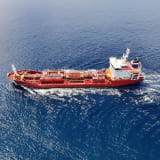
Last week, Japan’s maritime sector made significant strides towards a greener future, with notable advancements in sustainable power transmission and decarbonisation efforts.
Under the guidance of President Masahiro Ito, PowerX unveiled its latest endeavor, the establishment of “Maritime Power Grid,” a subsidiary dedicated to advancing marine power transmission. This move coincided with the signing of a Memorandum of Understanding between Maritime Power Grid, the City of Yokohama, and TEPCO Power Grid, signalling the development of the world’s first electricity supply base for electric carriers within Yokohama Port.
The collaboration aims to bolster offshore wind power generation and pave the way for a carbon-neutral port at Yokohama, a vision underscored by Mayor Takeharu Yamanaka’s remarks, emphasizing the initiative’s role in Japan’s decarbonisation efforts. TEPCO Power Grid echoed this sentiment, pledging support for Yokohama City’s carbon-neutral port concept, demonstrating a unified commitment to sustainable energy solutions.
Looking ahead, Maritime Power Grid CEO Masahiro Ito outlined ambitious plans to expand offshore wind power generation off the Kanto coast using electric carriers, with Yokohama Port positioned as a key hub for green electricity transmission. These developments position Japan as a leader in sustainable power transmission solutions, poised to drive global efforts towards environmental stewardship.
In parallel, Mitsui O.S.K. Lines (MOL) made waves with its announcement to install a CO2 capture device on its LR1 product tanker “NEXUS VICTORIA” by the end of 2024. This groundbreaking initiative represents a significant milestone in Japan’s maritime industry, showcasing the adoption of innovative technologies to reduce emissions. While onboard carbon capture presents promising opportunities for emissions reduction, practical implementation faces significant hurdles and addressing these challenges will necessitate continued research, technological advancements and industry-wide collaboration. Despite these hurdles, MOL’s proactive steps towards practical implementation underscore its commitment to environmental sustainability and technological innovation.
In an interview with Mr. Yasushi Yamamoto, Executive Officer of NYK, a seasoned member of the maritime industry, insights gleaned from three decades of involvement in various projects were shared. Yamamoto san highlighted the collaborative nature of the industry, emphasizing collective efforts in addressing climate change. NYK Group’s ambitious “Decarbonisation Story” aims for net-zero greenhouse gas emissions by 2050 and reflects the company’s willingness to contribute. Projects involving zero-emission fuels and energy-saving technologies further underscore NYK’s proactive approach to environmental sustainability.
Japan’s current initiatives in the maritime sector are rapidly evolving, marking the country’s leadership in pioneering sustainable power transmission solutions and driving decarbonisation efforts. Through strategic collaborations and technological innovations, Japan is poised to play a pivotal role in shaping the future of green energy transmission and carbon-neutral ports globally.
By Eugene Quek, Partner and Head of Projects in Japan
Articles
You may also be
interested in
View allGet in touch
Contact us today to find out how our expert team can support your business
















